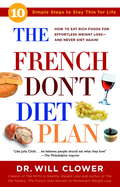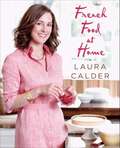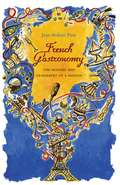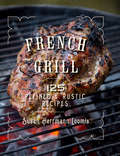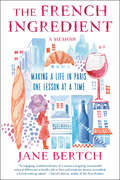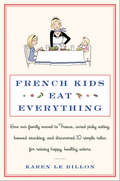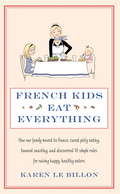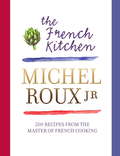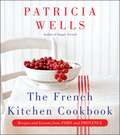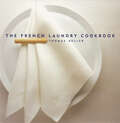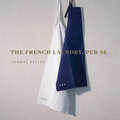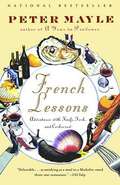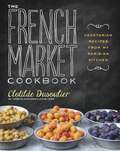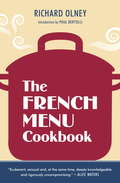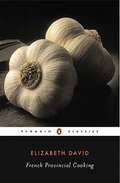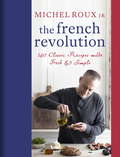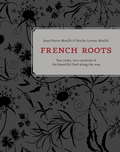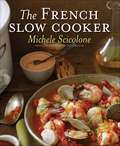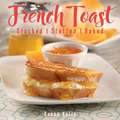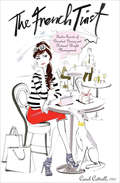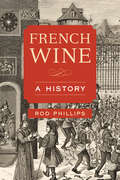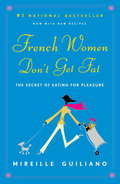- Table View
- List View
The French Don't Diet Plan
by William ClowerWouldn't you rather savor a buttery croissant instead of inhaling an artificially flavored diet shake? Isn't taking a relaxing stroll preferable to pounding out early morning miles on the treadmill? The French live this way, yet stay thin and healthy. Now, with The French Don't Diet Plan, you can, too! In his groundbreaking book, The Fat Fallacy, Dr. Will Clower was the first to present a theory of how the French maintain low obesity and heart disease rates despite their seemingly "unhealthy" lifestyle. Dr. Clower learned that the French don't worry about dieting but rather are more concerned with how they eat. That means paying attention to the taste, pacing, and enjoyment of meals, instead of counting calories, cutting fat and carbs, or taking guilt trips to the gym. With The PATH, his revolutionary weight-loss plan, Dr. Clower has helped thousands of people lose weight, lower cholesterol, and increase energy. Now, in The French Don't Diet Plan, Dr. Clower shows how easy it is to incorporate his remarkably effective techniques and the French lifestyle into a busy American day.Dr. Clower has found that natural foods have overwhelmingly been pushed out of the American diet by what he calls "faux foods": processed, additive-filled convenience products, often marketed as healthy with buzzwords like low fat and low carb. In addition, mealtimes should be a slow, sensual break for the body and mind--not a face-stuffing frenzy while standing up in the kitchen or sitting behind the wheel. As a result of such habits, Dr. Clower says, we are not eating what our bodies need, and we're eating in a way that is not conducive to proper digestion. Science shows this precise combination of factors causes weight gain.The French approach is about taking the time to enjoy real food without guilt or deprivation. Not only a successful path to becoming thin for life, The French Don't Diet Plan will help you put joie de vivre back into your relationship with food.The Most Delicious and Decadent Way to Lose Weight * Formerly forbidden foods, welcome back! Learn why butter, cheese, bread, and chocolate are health foods that keep hunger at bay. . . . See Step 2.* Spend more time eating! Discover why you should plan on having seconds and make meals last longer. . . . See Step 5.* Hate to work out? Find out why you don't have to exercise to lose pounds--and how relaxation can help keep weight off for good. . . . See Step 10.* Now you're cooking. Enjoy dozens of easy recipes for satisfying comfort foods, from Hot Artichoke-Cheese Dip to Creamy Alfredo Sauce, and Double-Almond Biscotti to Practically Flourless Chocolate Cake. . . . See Easy Recipes for Fabulous Foods.From the Hardcover edition.
French Food at Home
by Laura CalderThe French cooking of everyday life is lighthearted, accessible, and suited to modern tastes. Whether it's getting weeknight dinners on the table fairly fast (Basil Beef, Rhubarb Chops, or Carrot Juice Chicken) or leisurely cooking for dining at a slightly slower pace (Lamb Tagine, Holiday Hen, or Fennel Bass), Laura Calder shares recipes she's created at home in her own French kitchen.
French Gastronomy: The History and Geography of a Passion (Arts and Traditions of the Table: Perspectives on Culinary History)
by Jean-Robert PitteThis we can be sure of: when a restaurant in the western world is famous for its cooking, it is the tricolor flag that hangs above the stove, opined one French magazine, and this is by no means an isolated example of such crowing. Indeed, both linguistically and conceptually, the restaurant itself is a French creation. Why are the French recognized by themselves and others the world over as the most enlightened of eaters, as the great gourmets? Why did the passion for food—gastronomy—originate in France? In French Gastronomy, geographer and food lover Jean-Robert Pitte uncovers a novel answer. The key, it turns out, is France herself. In her climate, diversity of soils, abundant resources, and varied topography lie the roots of France's food fame. Pitte masterfully reveals the ways in which cultural phenomena surrounding food and eating in France relate to space and place. He points out that France has some six hundred regions, or microclimates, that allow different agricultures, to flourish, and fully navigable river systems leading from peripheral farmlands directly to markets in the great gastronomic centers of Paris and Lyon. With an eye to this landscape, Pitte wonders: Would the great French burgundies enjoy such prestige if the coast they came from were not situated close to the ancient capital for the dukes and a major travel route for medieval Europe? Yet for all the shaping influence of earth and climate, Pitte demonstrates that haute cuisine, like so much that is great about France, can be traced back to the court of Louis XIV. It was the Sun King's regal gourmandise—he enacted a nightly theater of eating, dining alone but in full view of the court—that made food and fine dining a central affair of state. The Catholic Church figures prominently as well: gluttony was regarded as a "benign sin" in France, and eating well was associated with praising God, fraternal conviviality, and a respect for the body. These cultural ingredients, in combination with the bounties of the land, contributed to the full flowering of French foodways. This is a time of paradox for French gourmandism. Never has there been so much literature published on the subject of culinary creativity, never has there been so much talk about good food, and never has so little cooking been done at home. Each day new fast-food places open. Will French cuisine lose its charm and its soul? Will discourse become a substitute for reality? French Gastronomy is a delightful celebration of what makes France unique, and a call to everyone who loves French food to rediscover its full flavor.
French Gastronomy: The History and Geography of a Passion
by Jean-Robert Pitte Jody GladdingThis we can be sure of: when a restaurant in the western world is famous for its cooking, it is the tricolor flag that hangs above the stove, opined one French magazine, and this is by no means an isolated example of such crowing. Indeed, both linguistically and conceptually, the restaurant itself is a French creation. Why are the French recognized by themselves and others the world over as the most enlightened of eaters, as the great gourmets? Why did the passion for food -- gastronomy -- originate in France? In French Gastronomy, geographer and food lover Jean-Robert Pitte uncovers a novel answer. The key, it turns out, is France herself. In her climate, diversity of soils, abundant resources, and varied topography lie the roots of France's food fame. Pitte masterfully reveals the ways in which cultural phenomena surrounding food and eating in France relate to space and place. He points out that France has some six hundred regions, or microclimates, that allow different agricultures, to flourish, and fully navigable river systems leading from peripheral farmlands directly to markets in the great gastronomic centers of Paris and Lyon. With an eye to this landscape, Pitte wonders: Would the great French burgundies enjoy such prestige if the coast they came from were not situated close to the ancient capital for the dukes and a major travel route for medieval Europe? Yet for all the shaping influence of earth and climate, Pitte demonstrates that haute cuisine, like so much that is great about France, can be traced back to the court of Louis XIV. It was the Sun King's regal gourmandise -- he enacted a nightly theater of eating, dining alone but in full view of the court -- that made food and fine dining a central affair of state. The Catholic Church figures prominently as well: gluttony was regarded as a "benign sin" in France, and eating well was associated with praising God, fraternal conviviality, and a respect for the body. These cultural ingredients, in combination with the bounties of the land, contributed to the full flowering of French foodways. This is a time of paradox for French gourmandism. Never has there been so much literature published on the subject of culinary creativity, never has there been so much talk about good food, and never has so little cooking been done at home. Each day new fast-food places open. Will French cuisine lose its charm and its soul? Will discourse become a substitute for reality? French Gastronomy is a delightful celebration of what makes France unique, and a call to everyone who loves French food to rediscover its full flavor.
French Grill: 125 Refined And Rustic Recipes
by Susan Herrmann Loomis“When it comes to France, you don’t normally think of barbecue, but Susan Hermann Loomis has channeled the grilling of her native America through the cuisine of her adoptive France in 125 stylish, bold-flavored recipes that will inspire you to fire up your grill.” —Steven Raichlen, Project Smoke Barbecue was invented in France? So says renowned cookbook author Susan Herrmann Loomis. When the Gauls were racing through lush forests in what is now Brittany, Normandy, and the Loire Valley, hunting wild boar, deer, and rabbit, they’d return to the village, build a fire, and split their prize from barbe a queue (head to tail) for roasting. Today, the French are still great barbecuers, though over the centuries they’ve refined their skills and borrowed methods from other cuisines: the grill from the US, the plancha from Spain, the mechoui from North Africa. Recipes include: Camembert Burgers Steak with Smoky Olives Honey Grilled Pork Chops Grilled Pistachio, Almond, and Honey Stuffed Apricots French Grill features dishes for every occasion using ingredients that any American cook can easily find, tips on how to buy the best ingredients, and French grilling anecdotes throughout.
The French Ingredient: Making a Life in Paris One Lesson at a Time; A Memoir
by Jane BertchThe inspiring and delicious memoir of an American woman who had the gall to open a cooking school in Paris—a true story of triumphing over French naysayers and falling in love with a city along the way&“An engaging, multilayered story of a woman navigating innumerable cultural differences to build a life in Paris and create her dream: to establish a French cooking school.&”—David Lebovitz, author of My Paris KitchenWhen Jane Bertch was seventeen, her mother took her on a graduation trip to Paris. Thrilled to use her high school French, Jane found her halting attempts greeted with withering condescension by every waiter and shopkeeper she encountered. At the end of the trip, she vowed she would never return.Yet a decade later she found herself back in Paris, transferred there by the American bank she worked for. She became fluent in the language and excelled in her new position. But she had a different dream: to start a cooking school for foreigners like her, who wanted to take a few classes in French cuisine in a friendly setting, then bring their new skills to their kitchens back home. Predictably, Jane faced the skeptical French—how dare an American banker start a cooking school in Paris?—as well as real-estate nightmares, and a long struggle to find and attract clients.Thanks to Jane&’s perseverance, La Cuisine Paris opened in 2009. Now the school is thriving, welcoming international visitors to come in and knead dough, whisk bechamel, whip meringue, and learn the care, precision, patience, and beauty involved in French cooking. The French Ingredient is the story of a young female entrepreneur building a life in a city and culture she grew to love. As she established her school, Jane learned how to charm, how to project confidence, and how to give it right back to rude waiters. Having finally made peace with the city she swore to never revisit, she now offers a love letter to France, and a master class in Parisian cooking—and living.
French Kids Eat Everything
by Karen Le BillonMoving her young family to her husband's hometown in northern France, Karen Le Billon is prepared for some cultural adjustment but is surprised by the food education she and her family (at first unwillingly) receive. In contrast to her daughters, French children feed themselves neatly and happily-eating everything from beets to broccoli, salad to spinach, mussels to muesli. The family's food habits soon come under scrutiny, as Karen is lectured for slipping her fussing toddler a snack-"a recipe for obesity!"-and forbidden from packing her older daughter a lunch in lieu of the elaborate school meal. The family soon begins to see the wisdom in the "food rules" that help the French foster healthy eating habits and good manners-from the rigid "no snacking" rule to commonsense food routines that we used to share but have somehow forgotten. Soon, the family cures picky eating and learns to love trying new foods. But the real challenge comes when they move back to North America-where their commitment to "eating French" is put to the test. The result is a family food revolution with surprising but happy results-which suggest we need to dramatically rethink the way we feed children, at home and at school.
French Kids Eat Everything: How our family moved to France, cured picky eating, banned snacking and discovered 10 simple rules for raising happy, healthy eaters
by Karen Le BillonFar too many parents face an ongoing struggle to get their kids to eat well, so why is it that French children gladly wolf down all the things our kids hate - the dreaded spinach or broccoli, fish, olives, salad...? In French Kids Eat Everything, Karen Le Billon shares her experience of moving to France and finding the inspiration to transform her family's approach to eating.If you've ever tried hiding healthy foods in your kids' meals, bribing them to finish - or even start - something healthy, or simply given up in exasperation at your child's extensive list of banned foods, this book will strike a chord. It charts the author's enlightening journey from stressed mum of picky eaters, to proud - if somewhat surprised - parent of healthy, happy eaters. Along the way, you'll discover the 'food rules' that help the French foster healthy eating habits, why it's vital to get kids to try the same food many times over, the value of educating your children about food from an early age, why how you eat is just as important as what you eat - and much, much more.With tips, tricks, rules and routines for happy, healthy eaters - plus some fast, tasty recipes to try - this isn't just another tale of Gallic gastronomic superiority but a practical guide to instilling in your kids healthy eating habits that will last them a lifetime (and ensure less stressful mealtimes for you too!).
The French Kitchen: 200 Recipes From the Master of French Cooking
by Michel Roux Jr.French gastronomy is renowned for its classic recipes passed from generation to generation. From Burgundy to the Auvegne, Provence, the Loire and the Pyrenees, traditional family cooking has always been at the heart of the French kitchen and lifestyle. With its delicious dishes and exquisite ingredients as diverse as they regions from which they came from, heritage cooking and family values from provincial France have stood the test of time. In this book Michel Roux Jr., star of MasterChef and owner of the two-Michelin star Le Gavroche in London, explores the heritage of his native French cuisine. With classic recipes using delicious ingredients, Michel Roux Jr. will help you brings provincial French cooking into your kitchen and helps you to recreate the 'je ne sais quoi' that only French cuisine can embody.
The French Kitchen: 200 Recipes From the Master of French Cooking
by Michel Roux Jr.French gastronomy is renowned for its classic recipes passed from generation to generation. From Burgundy to the Auvegne, Provence, the Loire and the Pyrenees, traditional family cooking has always been at the heart of the French kitchen and lifestyle. With its delicious dishes and exquisite ingredients as diverse as they regions from which they came from, heritage cooking and family values from provincial France have stood the test of time. In this book Michel Roux Jr., star of MasterChef and owner of the two-Michelin star Le Gavroche in London, explores the heritage of his native French cuisine. With classic recipes using delicious ingredients, Michel Roux Jr. will help you brings provincial French cooking into your kitchen and helps you to recreate the 'je ne sais quoi' that only French cuisine can embody.
The French Kitchen Cook Book
by Patricia WellsA master class in fresh, delicious, French-inspired cooking Since 1995, students have waited months and sometimes years for the privilege of learning to cook with Patricia Wells at Chanteduc, her eighteenth-century Provençal farmhouse, and at her Parisian cooking studio. Now, the culinary legend invites home cooks into her life in France, making the recipes from her popular classes available to fans who dream of embarking on their own gastronomic adventure in the world's culinary capital. Beautifully designed and lavishly illustrated with stunning color photographs, The French Kitchen Cookbook offers simple yet profound pleasures to Patricia's students: the satisfaction of preparing a perfect fruit tart; the gratification of extracting a warm, fragrant, golden brioche from the oven; the giddiness of sharing a meal with a group of former strangers who quickly become lifelong friends. Patricia's meticulously written recipes explain the basics—rules that will help anyone become a better cook—while providing the deep satisfaction that comes from creating exquisite food that extracts the best of fresh ingredients. Here are some of her best recipes for appetizers, desserts, and everything in between, dishes inspired by the vibrant Provençal countryside and the bustle of Parisian life, including Miniature Onion and Goat Cheese Tatins, Zucchini and Basil Velouté, Fricassée of Chicken with Fennel, Capers, Tomatoes and Sausage, and Apricot and Lavender Honey Sorbet. "The French Kitchen Cookbook is about a way of life and a lifestyle of food and entertaining," Patricia writes. "It is all about the joys of combining good food, good wine, and friends altogether around the table—an experience we can enjoy day in and day out, any time. "
The French Laundry Cookbook: The French Laundry Cookbook And Ad Hoc At Home (The Thomas Keller Library)
by Deborah Jones Thomas Keller Susie Heller2014 marks the twentieth anniversary of the acclaimed French Laundry restaurant in the Napa Valley—“the most exciting place to eat in the United States” (The New York Times). The most transformative cookbook of the century celebrates this milestone by showcasing the genius of chef/proprietor Thomas Keller himself. Keller is a wizard, a purist, a man obsessed with getting it right. And this, his first cookbook, is every bit as satisfying as a French Laundry meal itself: a series of small, impeccable, highly refined, intensely focused courses. Most dazzling is how simple Keller's methods are: squeegeeing the moisture from the skin on fish so it sautées beautifully; poaching eggs in a deep pot of water for perfect shape; the initial steeping in the shell that makes cooking raw lobster out of the shell a cinch; using vinegar as a flavor enhancer; the repeated washing of bones for stock for the cleanest, clearest tastes. From innovative soup techniques, to the proper way to cook green vegetables, to secrets of great fish cookery, to the creation of breathtaking desserts; from beurre monté to foie gras au torchon, to a wild and thoroughly unexpected take on coffee and doughnuts, The French Laundry Cookbook captures, through recipes, essays, profiles, and extraordinary photography, one of America's great restaurants, its great chef, and the food that makes both unique. One hundred and fifty superlative recipes are exact recipes from the French Laundry kitchen—no shortcuts have been taken, no critical steps ignored, all have been thoroughly tested in home kitchens. If you can't get to the French Laundry, you can now re-create at home the very experience Wine Spectator described as “as close to dining perfection as it gets.”
The French Laundry, Per Se: The Art Of Finesse (The Thomas Keller Library)
by Thomas KellerNamed one of Publishers Weekly&’s Best Books of 2020 &“Every elegant page projects Keller&’s high standard of &‘perfect culinary execution&’. . . . This superb work is as much philosophical treatise as gorgeous cookbook.&”—Publishers Weekly, STARRED REVIEW Bound by a common philosophy, linked by live video, staffed by a cadre of inventive and skilled chefs, the kitchens of Thomas Keller&’s celebrated restaurants—The French Laundry in Yountville, California, and per se, in New York City—are in a relationship unique in the world of fine dining. Ideas bounce back and forth in a dance of creativity, knowledge, innovation, and excellence. It&’s a relationship that&’s the very embodiment of collaboration, and of the whole being greater than the sum of its parts. And all of it is captured in The French Laundry, Per Se, with meticulously detailed recipes for 70 beloved dishes, including Smoked Sturgeon Rillettes on an Everything Bagel, &“The Whole Bird,&” Tomato Consommé, Celery Root Pastrami, Steak and Potatoes, Peaches &’n&’ Cream. Just reading these recipes is a master class in the state of the art of cooking today. We learn to use a dehydrator to intensify the flavor and texture of fruits and vegetables. To make the crunchiest coating with a cornstarch–egg white paste and potato flakes. To limit waste in the kitchen by fermenting vegetable trimmings for sauces with an unexpected depth of flavor. And that essential Keller trait, to take a classic and reinvent it: like the French onion soup, with a mushroom essence stock and garnish of braised beef cheeks and Comté mousse, or a classic crème brûlée reimagined as a rich, creamy ice cream with a crispy sugar tuile to mimic the caramelized coating. Throughout, there are 40 recipes for the basics to elevate our home cooking. Some are old standbys, like the best versions of beurre manié and béchamel, others more unusual, including a ramen broth (aka the Super Stock) and a Blue-Ribbon Pickle. And with its notes on technique, stories about farmers and purveyors, and revelatory essays from Thomas Keller—&“The Lessons of a Dishwasher,&” &“Inspiration Versus Influence,&” &“Patience and Persistence&”—The French Laundry, Per Se will change how young chefs, determined home cooks, and dedicated food lovers understand and approach their cooking.
French Lessons: Adventures With Knife, Fork, And Corkscrew (Vintage Departures Ser.)
by Peter MayleFrom Peter Mayle, a joyous exploration and celebration of the infinite gastronomic pleasures of France. Ranging far from his adopted Provence, Mayle now travels to every corner of the country, armed with knife, fork, and corkscrew. He takes us to tiny, out-of-the-way restaurants, starred Michelin wonders, local village markets, annual festivals, and blessed vineyards. We visit the Foire aux Escargots at Martigny-les-Bains a whole weekend devoted to the lowly but revered snail. We observe the Marathon du Medoc, where runners passing through the great vineyards of Bordeaux refresh themselves en route with tastings of red wine (including Chateau Lafite-Rothschild!). There is a memorable bouillabaisse in a beachside restaurant on the Cute d'Azur. And we go on a search for the perfect chicken that takes us to a fair in Bourg-en-Bresse. There is a Catholic mass in the village of Richerenches, a sacred event at which thanks are given for the aromatic, mysterious, and breathtakingly expensive black truffle. We learn which is the most pungent cheese in France (it's in Normandy), witness a debate on the secret of the perfect omelette, and pick up a few luscious recipes along the way. There is even an appreciation and celebration of an essential tool for any serious food-lover in France, the "Michelin Guide. "Here we have all the glory and pleasure of the French table in the most satisfying book yet from the toujours delightfully entertaining." --Peter Mayle.
The French Market Cookbook: Vegetarian Recipes from My Parisian Kitchen
by Clotilde DusoulierCook from the farmer's market with inspired vegetarian recipes--many of which are gluten-free and dairy-free--with a French twist, all highlighting seasonal produce. Beloved ChocolateAndZucchini.com food blogger Clotilde Dusoulier is not a vegetarian. But she has, like many of us, chosen to eat less meat and fish, and is always looking for new ways to cook what looks best at the market. In The French Market Cookbook, she takes us through the seasons in 82 recipes--and explores the love story between French cuisine and vegetables. Choosing what's ripe and in season means Clotilde does not rely heavily on the cheese, cream, and pastas that often overpopulate vegetarian recipes. Instead she lets the bright flavors of the vegetables shine through: carrots are lightly spiced with star anise and vanilla in a soup made with almond milk; tomatoes are jazzed up by mustard in a gorgeous tart; winter squash stars in golden Corsican turnovers; and luscious peaches bake in a cardamom-scented custard. With 75 color photographs of the tempting dishes and the abundant markets of Paris, and with Clotilde's charming stories of shopping and cooking in France, The French Market Cookbook is a transportive and beautiful cookbook for food lovers everywhere.
The French Menu Cookbook
by Richard Olney Paul BertolliAs those who knew him will attest, Francophile and food writer Richard Olney was one of a kind-a writerly cook who had a tremendous influence on American cooking via his well-worn cottage on a hillside in Provence. Born in the Midwest in 1927 and drawn to France at the tender age of twenty-four, Olney was unapologetically attracted to the style, flavors, and tastes of French cooking when most Americans were smitten by the wonders of the new prepared foods in their markets. With unrelenting passion and precision, Olney studied and explored the cuisine, carefully documenting all he had learned for future generations of chefs, cooks, and food lovers. His first of several landmark works, THE FRENCH MENU COOKBOOK, was well ahead of its time with its authentic French recipes and then-unheard-of seasonal approach to cooking. Little did we know then that THE FRENCH MENU COOKBOOK would provide inspiration for Alice Waters and her compatriots as they built the groundwork for a culinary revolution in America. Brimming with the honest and enlightening explanations of how the French really cook and the 150-plus authentic recipes, this book is a masterful resource that is a must for every serious cook.From the Hardcover edition.
French Provincial Cooking
by Elizabeth DavidElizabeth David's books belong in the libraries of everyone who loves to read and prepare food and this one is generally regarded as her best; her passion and knowledge comes through on every page. She was one of the foremost writers on food in the latter half of the 20th century and this book has her most celebrated writing. French Provincial Cooking should be approached and read as a series of short stories, as well written and evocative as the best literature. the voice is highly personal and opinionated, sometimes sharp but always true and always entertaining. Here is a long essay on French cuisine, offering background stories and sketches of recipes more than the slavishly didactic type of recipes that most modern readers might be used to today. for many Elizabeth David was the first to introduce us to the French notion of la cuisine terroir, sometimes interpreted as 'what grows together goes together'. for David, this is the heart of regional cooking, and the thing which most distinguishes it from cooking in haute cuisine restaurants where diners arrive at any time or any season and expect to be able to order any well known French specialty. One of the passages which best characterizes David's approach to a lot of cooking is her opening statement on the perfect omelet: 'As everybody knows, there is only one infallible recipe for the perfect omelet: your own. ' the book starts with a short essay on each of the major culinary regions of France, starting perhaps not surprisingly with Provence which is blessed an abundance of produce. the largest portion of the book consists of chapters on cuisine by type of dish: Sauces, Hors-D'oeuvres and Salads, Soups, Eggs and Cheese, Pates and Terrines, Vegetables, Fish, Shellfish, Meat, Composite Meat Dishes, Poultry and Game, and Sweet dishes. the book is all the more valuable in that it paints a picture of a cooking style which existed before modern equipment such as the food processor. Most importantly, the recipes work if your aim is to produce the most excellent food imaginable. What initially may seem to be annoying details (e. g. , for omelets, eggs 'should not really be beaten at all, but stirred, ' whereas for scrambled eggs, they should be 'very well beaten') are actually secrets to be treasured, that elevate a good dish to a superb one. the lesson is that good food should be done simply, but it takes care, attention to detail, and frequently, time. A hardback edition of French Provincial Cooking has been unavailable for many years and Grub Street is re-issuing it because of overwhelming demand. It should become as popular an edition as the best-selling Elizabeth David Classics.
The French Revolution: 140 Classic Recipes made Fresh & Simple
by Michel Roux Jr.Michel Roux Jr's delicious collection of French recipes for the modern home cook.Michel Roux Jr is one of the best-known and most loved French chefs in Britain. He runs the renowned two-Michelin star restaurant Le Gavroche in London, as well as a number of other restaurants, and has presented many popular food programmes on TV. In The French Revolution, Michel revisits the classic dishes from his traditional French upbringing, but takes a modern approach that adapts his favourite recipes to suit home cooks today who are looking for light, healthy and easy-to-make options. Gone are the very rich creamy sauces, heavy meat dishes and complicated cooking techniques, as Michel replaces these with recipes that delight the palate without threatening the waistline. For instance, a delicate pea tart with filo-like brik pastry, a new hollandaise sauce containig hardly any butter and lots of clever low-calorie dressings. Michel also features recipes that can be made in one pot for speed and convenience, such as the delicious Poulet Basquaise - a fragrant, simple stew of chicken, peppers and spices. Other dishes can be put together from store cupboard ingredients for a quick mid-week supper - such as Chickpea and harissa soup, to be served alongside one of his many simple salads, tempting vegetable dishes or speedy desserts.These are not restaurant dishes - this is the food that Michel and his family cook and eat at home. In his beautiful new book, Michel brings the great cuisine of his native land into the 21st century - truly a French food revolution!
The French Revolution: 140 Classic Recipes made Fresh & Simple
by Michel Roux Jr.Michel Roux Jr's delicious collection of French recipes for the modern home cook. <P><P>Michel Roux Jr is one of the best-known and most loved French chefs in Britain. He runs the renowned two-Michelin star restaurant Le Gavroche in London, as well as a number of other restaurants, and has presented many popular food programmes on TV. In The French Revolution, Michel revisits the classic dishes from his traditional French upbringing, but takes a modern approach that adapts his favourite recipes to suit home cooks today who are looking for light, healthy and easy-to-make options. Gone are the very rich creamy sauces, heavy meat dishes and complicated cooking techniques, as Michel replaces these with recipes that delight the palate without threatening the waistline. For instance, a delicate pea tart with filo-like brik pastry, a new hollandaise sauce containing hardly any butter and lots of clever low-calorie dressings. Michel also features recipes that can be made in one pot for speed and convenience, such as the delicious Poulet Basquaise - a fragrant, simple stew of chicken, peppers and spices. Other dishes can be put together from store cupboard ingredients for a quick mid-week supper - such as Chickpea and harissa soup, to be served alongside one of his many simple salads, tempting vegetable dishes or speedy desserts. <P><P>These are not restaurant dishes - this is the food that Michel and his family cook and eat at home. In his beautiful new book, Michel brings the great cuisine of his native land into the 21st century - truly a French food revolution!
French Roots
by Patricia Unterman Denise Lurton Moullé Jean-Pierre MoulléA narratively rich cookbook of French and Californian recipes from longtime Chez Panisse executive chef Jean-Pierre Moulle and his wife, Denise Moulle. Jean-Pierre and Denise Moullé met on a street corner in Berkeley, California, in 1980; six months later they were married. French Roots is the story of their lives told through the food they cook--beginning with the dishes of old-world France, the couple's birthplace, and focusing on the simple, pared-down preparations of French food common in the postwar period. The story then travels to the San Francisco Bay Area in the 1970s, where Jean-Pierre was appointed executive chef at Chez Panisse when California cuisine was just emerging as a distinctive and important style, and where Denise began importing French wine. Finally, the journey follows the couple to their homes in Sonoma, California, and Bordeaux to revisit the classic dishes of the Moullés' native country and hone the forgotten skills of foraging, hunting, and preserving. Exquisitely written, with recipes that are innovative and timeless, insights on cooking and thinking like a chef, and an insider's guide to the wines of Bordeaux, French Roots is much more than a cookbook--it's a guide to living the good life.From the Hardcover edition.
The French Slow Cooker
by Michele ScicolonePlug it in and Cook with French Flair“I’d bet that if French cooks could get their hands on Michele Scicolone’s French Slow Cooker, which is filled with smart, practical, and convenient recipes, they’d never let it go.” — Dorie Greenspan, author of Around My French TableWith a slow cooker, even novices can turn out dishes that taste as though they came straight out of the kitchen of a French grandmère. Provençal vegetable soup. Red-wine braised beef with mushrooms. Chicken with forty cloves of garlic. Even bouillabaisse. With The French Slow Cooker, all of these are as simple as setting the timer and walking away. Michele Scicolone goes far beyond the usual slow-cooker standbys of soups and stews, with Slow-Cooked Salmon with Lemon and Green Olives, Crispy Duck Confit, and Spinach Soufflé. And for dessert, how about Ginger Crème Brûlée? With The French Slow Cooker, the results are always magnifique.
French Toast: Stacked, Stuffed, Baked
by Donna KellyThe author of Quesadillas and 101 Things to Do with a Toaster Oven wants you to enjoy French toast any time of the day. Donna Kelly begins with simple, classic French toast recipes and takes readers on an adventure of different styles, stuffings, toppings, and techniques to turn simple breakfast bread into decadent desserts, hearty sandwiches, and even casseroles. Recipes include Crunchy Graham Dipping Sticks and Maple Cream Syrup, Stuffed Croissant, Shrimp Croissant Casserole, Raspberry Cheesecake French Toast, Ham and Swiss Monte Cristos, Kentucky Hot Browns, Seven Layer Strawberry Torte, and many more. With tips on how to pick the right breads, methods on how to cook your toast to perfection, and a special section on sweet sauces and syrups, everyone will be begging for more French toast.
The French Twist: Twelve Secrets of Decadent Dining and Natural Weight Management
by Carol CottrillWith wit and wisdom, The French Twist: Twelve Secrets of Decadent Dining and Natural Weight Management explores the French attitudes of reverence and respect for food and dining. Based on a desire to take the American obsession with weight and fitness in a new direction, it exposes the shortcomings of quick-fix fad diets, encourages readers to examine their unique connections to food, and asks them to abandon their fears about eating and to reject such common myths as the idea that to lose weight we need to eat less and exercise more. Among the secrets the book reveals are the importance of eating authentic and high-quality food, and the role of pleasure and balance in proper nutrition and successful weight management. Throughout, the French approach is validated by up-to-date science on metabolism as it relates to the psychology of eating.,
French Wine: A History
by Rod PhillipsFor centuries, wine has been associated with France more than with any other country. France remains one of the world's leading wine producers by volume and enjoys unrivaled cultural recognition for its wine. If any wine regions are global household names, they are French regions such as Champagne, Bordeaux, and Burgundy. Within the wine world, products from French regions are still benchmarks for many wines. French Wine is the first synthetic history of wine in France: from Etruscan, Greek, and Roman imports and the adoption of wine by beer-drinking Gauls to its present status within the global marketplace. Rod Phillips places the history of grape growing and winemaking in each of the country's major regions within broad historical and cultural contexts. Examining a range of influences on the wine industry, wine trade, and wine itself, the book explores religion, economics, politics, revolution, and war, as well as climate and vine diseases. French Wine is the essential reference on French wine for collectors, consumers, sommeliers, and industry professionals.
French Women Don't Get Fat
by Mireille GuilianoStylish, convincing, wise, funny–and just in time: the ultimatenon-diet book, which could radically change the way you think and live. French women don’t get fat, but they do eat bread and pastry, drink wine, and regularly enjoy three-course meals. In her delightful tale, Mireille Guiliano unlocks the simple secrets of this “French paradox”–how to enjoy food and stay slim and healthy. Hers is a charming, sensible, and powerfully life-affirming view of health and eating for our times. As a typically slender French girl, Mireille (Meer-ray) went to America as an exchange student and came back fat. That shock sent her into an adolescent tailspin, until her kindly family physician, “Dr. Miracle,” came to the rescue. Reintroducing her to classic principles of French gastronomy plus time-honored secrets of the local women, he helped her restore her shape and gave her a whole new understanding of food, drink, and life. The key? Not guilt or deprivation but learning to get the most from the things you most enjoy. Following her own version of this traditional wisdom, she has ever since relished a life of indulgence without bulge, satisfying yen without yo-yo on three meals a day. Now in simple but potent strategies and dozens of recipes you’d swear were fattening, Mireille reveals the ingredients for a lifetime of weight control–from the emergency weekend remedy of Magical Leek Soup to everyday tricks like fooling yourself into contentment and painless new physical exertions to save you from the StairMaster. Emphasizing the virtues of freshness, variety, balance, andalwayspleasure, Mireille shows how virtually anyone can learn to eat, drink, and move like a French woman. A natural raconteur, Mireille illustrates her philosophy through the experiences that have shaped her life–a six-year-old’s first taste of Champagne, treks in search of tiny blueberries (calledmyrtilles) in the woods near her grandmother’s house, a near-spiritual rendezvous with oysters at a seaside restaurant in Brittany, to name but a few. She also shows us other women discovering the wonders of “French in action,” drawing examples from dozens of friends and associates she has advised over the years to eat and drink smarter and more joyfully. Here are a culture’s most cherished and time-honored secrets recast for the twenty-first century. For anyone who has slipped out of her zone, missed the flight to South Beach, or accidentally let a carb pass her lips, here is a buoyant, positive way to stay trim. A life of wine, bread–even chocolate–without girth or guilt?Pourquoi pas?
